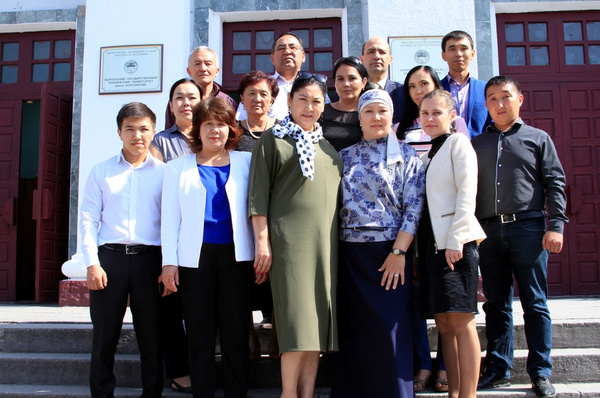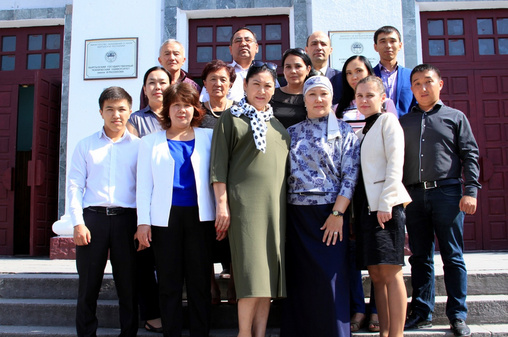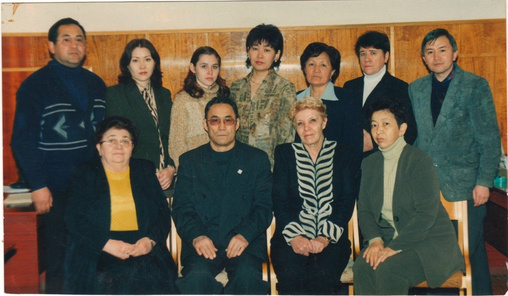Theoretical and general electrical engineering
Head of the Department
"Theoretical and General Electrical Engineering"
Candidate of Engineering Sciences, Associate Professor
Asanova Salima Muratovna
Address: 720044, Kyrgyzstan, Bishkek, Ch. Aitmatov Avenue 66, Building 1, Office 343
Phone: (312) 56-15-38
Email: a_sm07@kstu.kg
Website: www.kstu.kg
EDUCATIONAL ACTIVITIES
Bachelor's degree training
- in the field of 640200 "Electric Power Engineering and Electrical Engineering", specializations
"Digital Automation Systems in the Electric Power Industry"
DEPARTMENT HISTORY
The "Electropower and Electrical Engineering" Department was founded in 1955.
The department trains undergraduate students in all areas of KSTU and conducts classes at all KSTU faculties (Electroelectrics, Electrical Engineering, Technology, and Telecommunications), as well as at the KSTU Institute of Electrical Engineering, the Institute of Industrial Engineering, the Institute of Electronic Engineering, and the Polytechnic College, both full-time and part-time. Distance learning.
Total number of courses taught: 14
Theoretical Foundations of Electrical Engineering, Parts 1, 2, 3
Electrical Engineering
Electrical Engineering and Electronics
General Electrical Engineering and Electronics
Electrical Engineering, Electronics, and Electric Drives
Electrical Engineering and Electric Drives
Introduction to the Specialty
Digital Systems for Designing Power Plants and Substations
Automation and Digital Technologies in the Electric Power Industry
Mathematical Modeling and Programming of Electrical Engineering and Power Engineering Problems
Transient Processes in Electric Power Systems
Theory and Principles of Designing Digital Control Systems
Smart Grid
Artificial Intelligence in Energy
The experience gained by the department's staff is successfully used by other universities that have established similar or similar departments. The achievements of the faculty and staff in science and education have been repeatedly recognized with high state, government, and departmental awards.
The department's faculty, while maintaining the academic, methodological, and pedagogical traditions established in previous years, are improving their teaching methods, implementing new information technologies, publishing new teaching aids for students, and modernizing their laboratory facilities. The department has a computer lab and operates analog labs on electrical circuit theory, which utilize new universal laboratory setups developed by the department for the theory of electrical engineering, general electrical engineering, and electronics.
The department's laboratory practical training in electrical engineering disciplines effectively combines computer modeling in the computer lab with field studies of electrical circuits in the analog lab. The department is updating its laboratory equipment and measuring instruments, introducing new lab exercises based on the developed universal laboratory setup for electrical engineering and the computer simulation systems Electronics Workbench, Multisim, MathCad, and Matlab.
History of the Department
The Department of Theoretical Foundations of Electrical Engineering and General Electrical Engineering, the predecessor of the Department of Electrical Engineering, was established in 1955, simultaneously with the founding of the FPI itself. The first head was Boris Leonidovich Pichugin, PhD in Physics and Mathematics, and the department consisted of only four people (V.L. Pichugin, PhD in Physics and Mathematics, Assoc. Prof. Kh.Z. Kudyakova, Assoc. Prof. Kh.T. Tasbulatov, and Senior Lecturer Sh.M. Taukin). From 1956 to 1957, Senior Researcher I.T. Gertsenshtein served as Acting Head of the Department.
Since 1957, the department has been known as "Theoretical Foundations of Electrical Engineering and General Electrical Engineering." From 1958 to 1965, the department staff consisted of five people, and N.E. Golubkov served as Head of the Department. After him, the department was headed by the following professors: Sh. M. Taukin (1965-1970); V. A. Aleksandrov (1970-1976); A. A. Reznikov (1976-1990); B. E. Sartkaziev (1990-1992); T. I. Degtyarev (1992-1995), and K. A. Satarkulov (1995-2009).
In 2009, K. A. Satarkulov transferred the department to his student, Associate Professor E. B. Isakeeva, PhD (Engineering). The increasing number of students studying electrical engineering disciplines by the beginning of the 21st century dramatically increased the workload of electrical engineering laboratories. Therefore, in 2015-2016, under the leadership of E. B. Isakeeva, the department was reorganized. The laboratory facilities in the "Theoretical Foundations of Electrical Engineering" laboratory were modernized.
The "Electrical Engineering" and "Theoretical Foundations of Electrical Engineering" courses are based on physics and higher mathematics courses and contain engineering calculation and analysis methods applicable to a wide range of modern electrical devices. This is crucial for developing the scientific outlook of electrical engineering specialists and forms the foundation for all specialized electrical and radio engineering disciplines. Therefore, high demands are placed on the department's faculty and support staff in terms of the depth and thoroughness of their knowledge and teaching qualifications, their ability to convey material to students, their conscientious attitude to their work, and their dedication to the workplace.
Currently, the "Theoretical Foundations of Electrical Engineering and Electrical Engineering" department has a well-established base for educational, methodological, and scientific work, including educational laboratories.
The department is working to modernize its teaching methods for the Theoretical and Electrical Engineering course, integrating electronic textbooks and virtual lab systems into the curriculum. Leading instructors in this field include E.B. Isakeeva, S.M. Asanova, and K.M. Mukanbaev. For the numerous student cohorts, the department has created a series of frontal labs for the basic course "Theoretical Foundations of Electrical Engineering."
During this lab series, students have the opportunity to experimentally analyze physical processes in electrical circuits.
The experience gained by the department's staff is being successfully utilized by other universities in the republic, where similar or similar departments have been established. For example, all branches of the FPI (KSTU) that have become independent educational institutions—Osh, Kara-Kul, Tokmok, and others—use lab stands and instructional manuals developed and manufactured by the Theoretical and Electrical Engineering Department.
Practical classes in the Electrical Engineering course are supported by the department's original methodological developments. Lectures and practical classes are supported by laboratory workshops conducted in the following departmental laboratories: Theoretical Electrical Engineering; General Electrical Engineering.
The department provides advanced training for young faculty through lectures taught by experienced faculty members with extensive research and teaching experience: Candidate of Engineering Sciences, Associate Professor E.B. Isakeeva, Senior Lecturer K.M. Mukanbaev. Additionally, young faculty members are offered the opportunity to complete research and teaching internships at leading universities in the Russian Federation.
Currently, the department's faculty consists of one professor, four associate professors, five senior lecturers, and five support staff.







